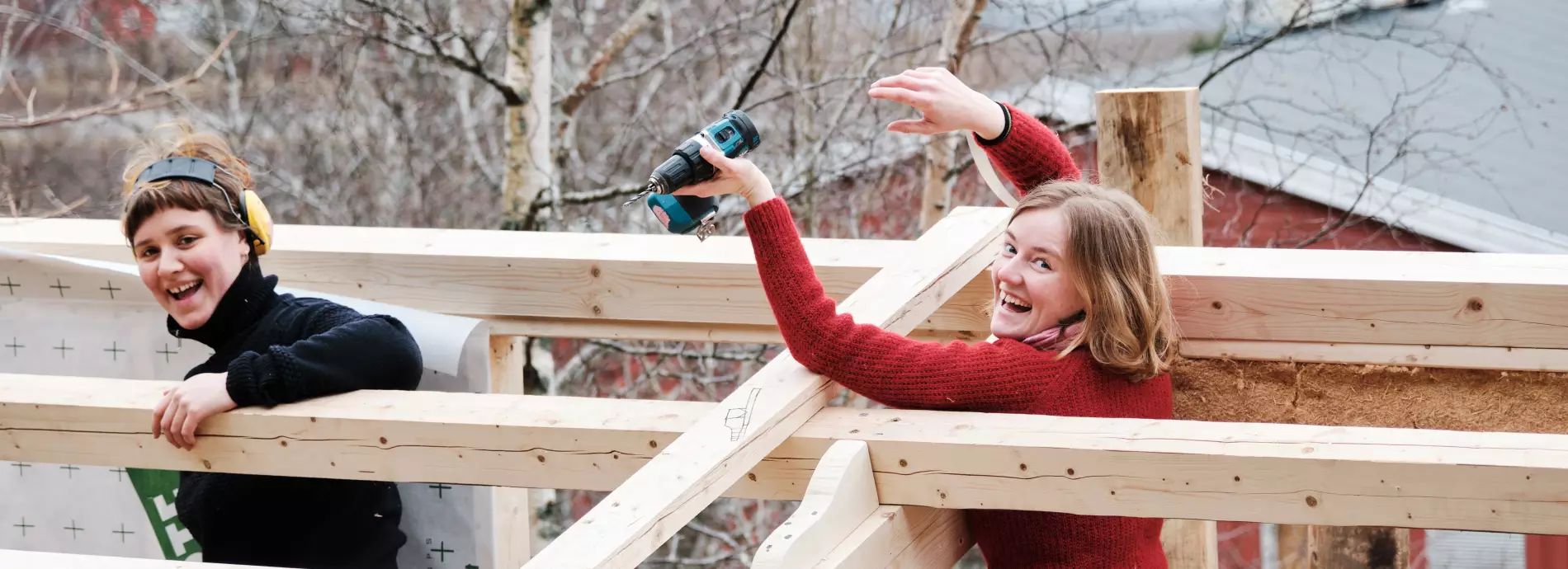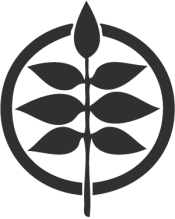

Tiny House Construction
- Fosen Folkehøgskole – Rissa
- Telephone: (+47) 40601638
- E-mail: kontor@fosen.fhs.no
- Course length: All year
- Course teaching amount: 15 hours/week
- Price: from NOK 150 310,-
- Location: Rissa
- Study tour: Høstutfart, Vårutfart


Learn to build a space-efficient, sustainable Tiny House! Students learn the basics of carpentry and woodwork.
In this course you’ll learn how to build small, healthy houses. You’ll get fundamental training in carpentry and woodworking, and you’ll learn to use both modern machines and traditional handtools.
Some materials are bought second hand, and we also find bits and pieces at the recycling station. Our goal is to build houses that are inexpensive, sustainable and comfortable to live in.
The main focus is on joist construction. We start by drawing and designing our house. Then we’ll start building! We’ll build a frame, set up walls, then beams for the roof. We’ll seal it from the wind, put a roof on, put in windows, insulate, and install side paneling. On the inside we’ll set put up paneling and moulding.
That’s how you’ll learn about all the processes and parts of the house. Whether you want to build your own house in the future, or just be a bit better with your hands, this is a good line for you.
Most of the houses we build will be stationary. There will be some theory about mobile houses, but the focus is on stationary tiny houses.
Classes are held in Norwegian/Danish, but English speakers are welcome to apply. We will translate key point as needed, but we expect you to learn Norwegian.
To ganger i året drar hele skolen på felles tur. Hver høst og vår seiler vi ut til øya der vi har sauene våre. Fellesturene er vanligvis 5 dager.
Mandatory: Yes
Price: Included in course price
Meals included per day: 3
På høsten, i september/oktober seiler vi avsted til Utsetøya, øst for Hitra, i selvbygde åpne trebåter. Her er det nordlys og stjernklart, og morild i sjøen til nattbading. Øya har store fine gressletter til lek og moro, om kvelden bål og sang. Det er ørn i lufta og masse spennede fisk i havet.
Alle på skolen er med. Vi samler villsauene våre, undersøker de og frakter noen hjem til slakting.
På turen lærer du å seile råseilbåt, å kle deg godt, om villsau, kystlandskap og livet i fjæra,. Vi fisker, spiser blåskjell og krabber.
Turen varer i 5 dager.
Mandatory: Yes
Price: Included in course price
Meals included per day: 3
Om våren drar vi igjen til Utsetøya ved Hitra for å samle villsauene våre. Nå er det kommet mange små lam. Det er varmt i lufta og grønt på trærne. Villsauen er en spesiell rase, blant annet klipper vi ikke ulla, men napper den. Så det gjør vi nå, samt at vi merker de nye lammene. Ulla tar vi med hjem, slik at du kan lage noe av den.
Så er det tid til å bade i lange lyse sommernetter, sove under open himmel, seile mer, fiske og leke. Kanskje kommer spekkhoggeren opp langs med båten på hjemturen.
Dette er avslutningsturen vi har på skolen, så alle er med.
Turen varer i 5 dager.
Fosen Folk School is internationally recoginized as a Craft school. Here you will learn to make things from scratch, usually with material found in nature and old techniques. The boat building class will fell the very trees they'll use to build thier boats. And those on the Handwork line will spin and knit with yarn from the school's sheep, and can color that yarn with moss and heather.
We like to call ourselves a self-reliancy school. In a time when so much of that around us is made by someone else we want to teach you to be independant and self-reliant, without giving in to consumerism. We believe that everyone who can should grown more of their own food, fish more, and consume and throw away less. Reduce, reuse, recycle, repair.
Self-reliance runs through both our courses, and our electives. In Mini-house building you will learn to build an enviormentally friendly, energy efficient house. In Farming you will learn to grow your own food, and raise animals, on a small scale. In Self-reliance you will learn to repair clothes and equipment, grow your own food, and make all sorts of different things. In this way you can consume less, while living in either the town or the country.
Our school has it's own organic farm with animals and vegetables. A majority of the meat and vegetables we eat comes from our farm, giving us a unique relationship to the food we eat and the ingredients we use. We try to serve locally produced food as much as possible.